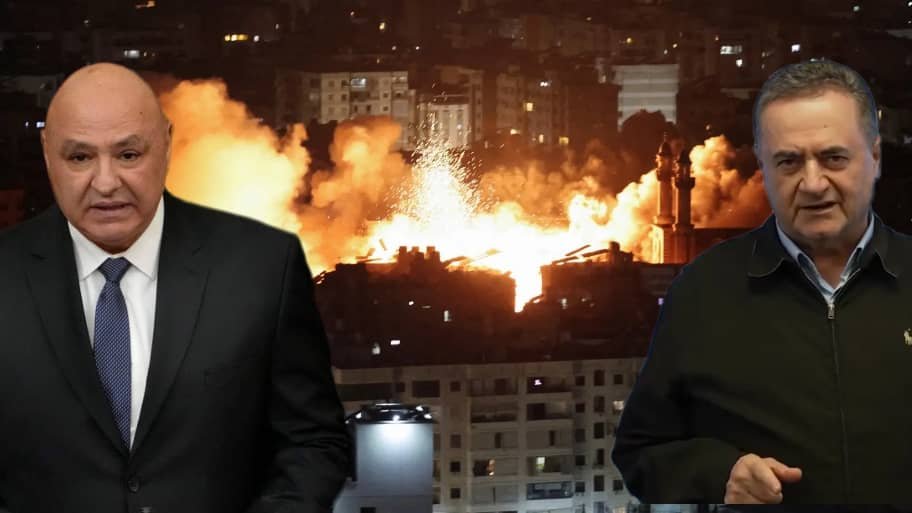Steven Sahiounie, journalist and political commentator
On June 5, the eve of the Muslim Al Adha holiday, Israel carried out the largest air attack on Beirut since the November 27 ceasefire.
All the Arab news channels carried live coverage of the repeated attacks on the southern residential section of Beirut, home to hundreds of thousands of civilians. Men, women and children were scrambling to leave the area as the devastating attacks sent mushroom-clouds into the evening sky.
Commercial planes were easily seen in the live coverage coming in to land at Rafik Hariri International airport. Every few minutes, another plane would come into sight on the TV screen as viewers were alarmed they might see a stray Israeli airstrike take out a passenger jet, carrying hundreds of people. The pilots and crew must have been alarmed to have to land in a war-zone instead of a holiday destination.
Israeli Defense Minister, Israel Katz, has vowed to continuing the bombing until Israel’s security if assured.
Israel issued a forced evacuation order one hour before the attacks. They claimed, without evidence, that they were going to strike Hezbollah “drone factories” in south Beirut.
The Lebanese army offered to search the buildings under question and report to the de-confliction committee if weapons had been found. Israel carried out the attacks despite the offer to inspect the sites.
Lebanon’s National News Agency reported that Israeli fighter jets had carried out about a dozen strikes in the attack, and other media conformed nine buildings were destroyed in the densely populated residential district, with dozens of other buildings damaged.
In late April, Israel carried out an attack which claimed to target Hezbollah’s storage of precision missiles. After the attack, Lebanon’s government said at least 190 people had died in attacks since the ceasefire, with nearly 500 wounded.
President Joseph Aoun has appealed to the U.S. and France to stop Israel from attacking, as guarantors of the ceasefire. Israel has been documented as violating the ceasefire on a near-daily basis by Lebanon, Arab nations, and human rights groups.
Many experts have said the U.S. is not a neutral party in the ceasefire, because they refuse to stop Israel, which uses weapons sent free-of-charge from the American tax-payer. Recently, the US envoy to Lebanon, Morgan Ortegas, was transferred. Her heavy-handed and undiplomatic attitude was disappointing to important players in Lebanon.
The ceasefire agreement was to see the Lebanese army disarm Hezbollah, thus allowing the influential group to revert to simply a political party. The Israeli war on Lebanon destroyed huge amounts of Hezbollah weapons, killed thousands of Iran-backed resistance fighters, along with hundreds of unarmed and innocent civilians.
“The Israeli enemy violations of the deal and its refusal to respond to the committee is weakening the role of the committee and the army,” the Lebanese military said in a statement.
President Joseph Aoun denounced the strikes as a “flagrant violation of international accords,” while Prime Minister Nawaf Salam called them an assault on Lebanon’s sovereignty. Parliament Speaker Nabih Berri characterized the attacks as targeting “all Lebanese people” during a sacred holiday.
Lebanon urgently contacted U.S. and French officials—guarantors of the ceasefire—demanding they restrain Israel. France publicly condemned the violations.
Hezbollah lawmaker Ali Ammar urged political factions to convert condemnations into concrete diplomatic action. The group denied operating drone facilities in civilian areas.
Lebanon had been a prime destination for wealthy tourists from the Arab Gulf. Beaches in summer, snow-capped mountain ski resorts in winter, and the year-round nightclub and music scene drew tourists and their dollars into Lebanon before the civil war began in 1975. The Lebanese diaspora flocked back home in summer for the many music festivals, which drew European tourists as well.
The civil war kept tourists away, but afterwards there was a restoration as Beirut came back to life in peace. However, by the early 2000’s the Iran-backed Hezbollah gained power, and the tourism trade with the Gulf dried up, and the economy suffered from the loss of billions of dollars in the annual tourism trade.
The UAE and Kuwait have lifted years-long travel bans, and experts await a decision from Saudi Arabia to follow suit. Lebanon is looking for good diplomatic and tourism ties with the Arab Gulf. The Iranian influence has waned, leaving the Lebanese government with a path open to restoring relationships with Syria, the regional countries, and the U.S. and its allies.
Security remains the key to tourism. The Israeli ceasefire violations and continual airstrikes stand in the way to success for the Lebanese tourism sector, which accounted for almost 20% of Lebanon’s economy prior to 2019.
According to the World Bank, poverty in Lebanon nearly tripled over the past decade. Inflation is soaring, with the Lebanese Lira losing 90% of its value, and the banks closed resulting in the loss of savings accounts for many.
Lebanon intensified efforts to attract Gulf tourists, hosting promotional events in Beirut and removing Hezbollah banners from major highways. Tourism Minister Laura Lahoud emphasized that lifting Saudi Arabia’s travel ban is critical for economic recovery.
Despite tourism optimism, the Lebanese pound remains at 10% of its pre-crisis value, with nearly half the population in poverty. The Policy Initiative think tank warned that tourism alone is a “morphine shot” without structural reforms.
Ongoing talks with the International Monetary Fund require Lebanon to implement anti-corruption measures, banking reforms, and public service improvements to secure billions in loans.
Lebanon faces compounding crises. Israeli military escalation jeopardizes the fragile ceasefire. Political unity against Israeli strikes has not translated into the Hezbollah disarmament progress. Economic revival depends on both Gulf reconciliation and domestic reforms. With Israel threatening further attacks and Lebanon’s army considering suspension of ceasefire cooperation, the next 72 hours remain critical for regional stability.
Steven Sahiounie is a two-time award-winning journalist.



